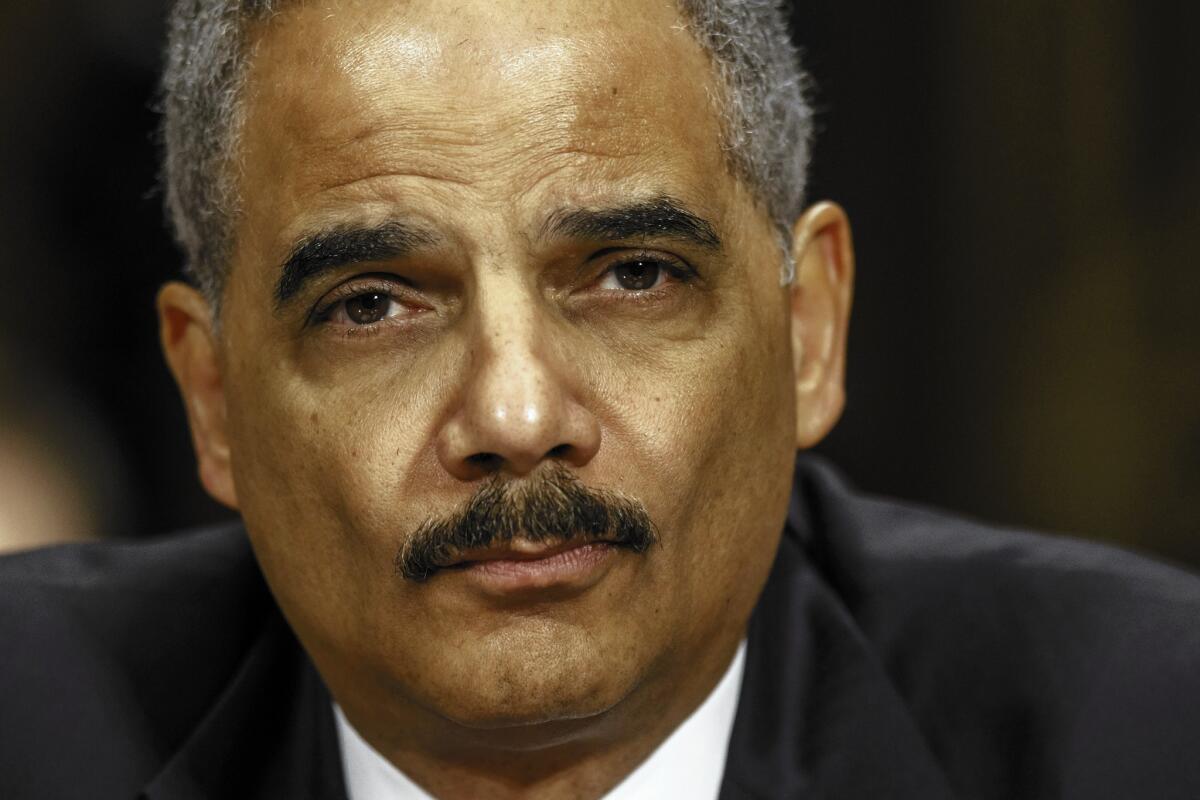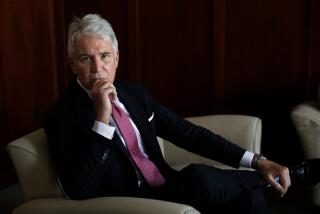Atty. Gen. Eric Holder reinvigorated to pursue his goals

WASHINGTON — Eric H. Holder Jr. sounds like a man who suddenly found a second wind.
During his first four years as America’s top law enforcement officer, Holder’s tenure at the Justice Department seemed so unfocused and controversy-prone that even Democrats began to question what the nation’s first African American attorney general had accomplished, and whether he had the passion to stick it out.
But since President Obama’s reelection, the 63-year-old Holder has tackled his responsibilities with newfound energy and determination, surprising critics and supporters alike by striking out on a broad, ambitious and unapologetically liberal agenda.
He moved to shorten prison sentences of nonviolent criminals, went after some of the nation’s largest banks for fraud, sued two states to block laws he said would make voting more difficult for minorities, and signaled plans to bar federal agents from considering religion, national origin, gender or sexual orientation in investigations.
Just this month, he called upon states to scrap laws preventing ex-convicts from voting, and issued a directive expanding government recognition of same-sex marriages to federal courtrooms and prisons, giving gay and lesbian spouses the same rights as married couples even in states that don’t recognize such unions.
“I am focusing on issues — really focusing on issues — in these last few weeks that have been near and dear to me for as long as I’ve been a lawyer,” Holder said in an interview. “This whole notion of criminal justice reform, civil rights enforcement — all these are the kinds of things that animated me and that made me want to become a lawyer in the first place.”
The attorney general bristled slightly at the suggestion that his record might be a disappointment to some. He pointed to his efforts to revitalize the department’s demoralized civil rights division and to keep the nation safe from terrorism, among other accomplishments.
But even colleagues acknowledge that those early years were hardly the ambitious “new day” that Holder promised when taking over the high-profile post. Instead, his time was consumed by politically sensitive national security debates, such as the administration’s unsuccessful effort to try Sept. 11 conspirators in the United States and the botched Fast and Furious anti-gun-trafficking operation along the U.S.-Mexico border.
Only last year Holder hinted he might be growing tired of the job amid mounting criticism. He has faced near-constant calls for his resignation, not just from conservative lawmakers — who most recently accused him of dragging his feet in investigating allegations that the Internal Revenue Service targeted tea party groups. Progressives, who feel let down by what they see as Holder’s failure to more actively pursue civil rights policies, have also called for his resignation.
Had he stepped down at the end of last year as many predicted, Holder might only be remembered as the first sitting Cabinet member to be held in contempt of Congress, for refusing to hand over documents to House Republicans in their investigation into Fast and Furious.
He even joked that his legacy at the Justice Department was destined to be his “deadly” jump shot. But now it appears Holder wants to leave a mark at the department beyond his skills on the basketball court.
“He wants to put some points on the board before he leaves,” one confidant said.
White House pressure also played a role. Obama, a longtime friend, made a personal appeal for him to stay on the job. Holder revealed in the interview that he wrote Obama a lengthy memo outlining “a second-term agenda for the Justice Department” that included many of the very issues he has been tackling in recent weeks.
“There’s no question that he has become more active,” said Jonathan Turley, a law professor at George Washington University who writes a civil liberties blog. Turley has criticized Holder’s defense of controversial surveillance programs to combat terrorism and the Justice Department’s use of subpoenas to search journalists’ phone and email records to uncover leaks.
“One of the greatest complaints against Holder has been that he has been relatively passive in addressing [civil liberties and national security] problems created by this and the former administration,” Turley said. “It’s clear Holder has been given marching orders to ramp up these policies, if nothing else to change the subject from [National Security Agency leaker Edward] Snowden and civil liberties.”
These days Holder’s friends and colleagues no longer know whether to believe him when he tells them — as he has several times before — that he’s ready to quit.
In the interview, Holder said he had no fixed departure date in mind and that he would base a decision on his progress in fulfilling his goals, rather than the calendar. Former colleagues say he is most likely to go by the end of the year.
In the meantime, Holder shows no signs of backing down from what some see as a deeply personal agenda.
After growing up in a lower-middle-class, largely black neighborhood in New York, he has made clear he feels a special responsibility to African Americans and other minorities.
Speaking to a group of 17 ex-convicts in Philadelphia last year, Holder told the men, “I grew up in a neighborhood in Queens where guys like you would have been my boys, you know?” Under different circumstances, he added, they all might have “partied” and played ball together.
That commitment is apparent in Holder’s signature initiative: reducing the racial inequities in state and federal prison populations and sentencing. About 40% of the nation’s prisoners are black, three times their representation in the overall population.
In August, Holder, a former judge, prosecutor and corporate lawyer, directed federal prosecutors to stop using mandatory prison sentences to incarcerate low-level, nonviolent drug offenders. Since then he has been traveling the country to witness and promote programs like one in Philadelphia that diverts drug offenders to rehab programs and community service.
He has also pushed Congress, with some success, to slash prison terms for those who receive mandatory sentences and to reform laws that result in longer jail terms for crimes involving crack cocaine versus powder cocaine, a policy that has had a disproportionate impact on African Americans. Last month the Senate Judiciary Committee approved a sentencing reform bill backed by Holder.
Holder has made voting rights for the poor, minorities and the elderly another of his civil rights priorities.
After the Supreme Court in June struck down a key section of the Voting Rights Act, Holder responded aggressively, putting states on notice that the Justice Department would ensure that they did not cross the line in making voting more difficult.
He filed suit against Texas and North Carolina under other sections of the act and recently hired two prominent voting rights lawyers, Debo Adegbile and Pamela Karlan, to devise a broader response to the court’s opinion, which seemed to eviscerate the granddaddy of civil rights laws.
Holder has been more active in other areas as well. After an initial hesitancy by Justice Department officials to pursue large financial firms thought to be responsible for the 2008 financial crisis, the department threatened a lawsuit against JPMorgan Chase & Co. — which agreed to a $13-billion settlement late last year — and sued Bank of America. Holder said more such actions were imminent.
Holder’s next target may be expanding the ban against racial profiling in law enforcement investigations to include religion and ethnicity.
Last month, Holder was handed perhaps his toughest assignment from Obama, one that many in the legal community predict he will be unable to complete. The president, trying to quell some of the public outrage about NSA surveillance, asked Holder and the director of national intelligence to figure out a new way to store the vast database of phone call logs made by U.S. citizens so it is not directly in government hands.
Telephone companies do not want the responsibility either, and no one else is volunteering, raising doubts that a viable alternative can be found.
But Holder says he is determined to come up with a solution and to pursue his agenda as well.
“I still have an awful lot that I want to do,” said Holder, who is only the second Democrat to hold the job in the last 33 years. “I want to focus on voting rights; I want to focus on criminal justice reform; I want to focus on the financial cases that we’ll be announcing, I think, relatively soon.”
More to Read
Start your day right
Sign up for Essential California for news, features and recommendations from the L.A. Times and beyond in your inbox six days a week.
You may occasionally receive promotional content from the Los Angeles Times.







